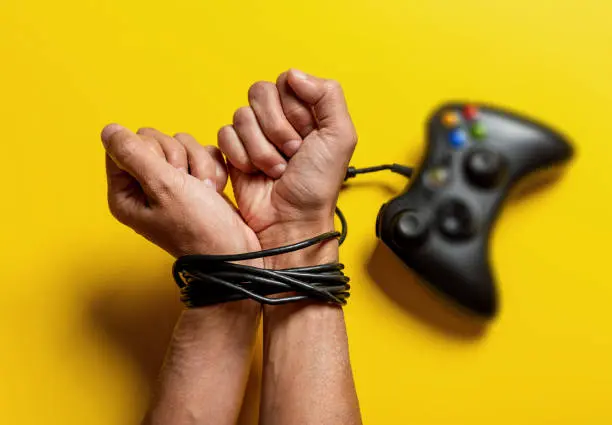
Understanding Gaming Addiction: Signs, Causes, and How to Seek Help
- Admin
With the rapid growth of the video game industry, gaming has become one of the most popular forms of entertainment worldwide. However, for some, gaming can develop into an unhealthy obsession, leading to what is known as gaming addiction. As more people engage in immersive online and multiplayer games, concerns about gaming addiction have risen, especially as it impacts mental and physical health, social interactions, and overall well-being.
What is Gaming Addiction?
Gaming addiction, or Internet Gaming Disorder (IGD), is characterized by excessive or compulsive use of video games that interferes with daily life. People with gaming addiction often struggle to control their gaming habits, resulting in neglect of personal responsibilities, relationships, and self-care. The World Health Organization (WHO) officially recognized Gaming Disorder in 2018 as a mental health condition, highlighting the need to address its effects.
Signs and Symptoms of Gaming Addiction
Recognizing the symptoms of gaming addiction can help individuals or their loved ones take steps toward intervention. Common signs include:
Preoccupation with gaming: Constant thoughts about gaming, planning the next session, or feeling restless when not playing.
Loss of interest in other activities: Gradually losing interest in hobbies, sports, or social events that were previously enjoyable.
Neglecting responsibilities: Failing to fulfill school, work, or personal obligations due to excessive gaming.
Withdrawal symptoms: Experiencing anxiety, irritability, or mood swings when unable to play.
Lying about gaming habits: Hiding the amount of time spent gaming from family or friends.
Inability to stop: Despite negative consequences, being unable to reduce or stop gaming.
These signs can affect various aspects of life, from personal relationships to academic or professional performance. Recognizing the symptoms early is crucial for preventing more severe impacts on an individual's mental and physical health.
Causes of Gaming Addiction
Gaming addiction doesn't have a single cause. Instead, a combination of factors contributes to its development, including:
Psychological factors: Video games are designed to be engaging, often with reward systems that trigger dopamine release, similar to other addictive behaviors. This can create a cycle where individuals crave the satisfaction and achievements that games provide.
Social factors: Online multiplayer games create a sense of community and belonging, which can appeal to those who feel socially isolated. For some, online relationships may take precedence over real-world interactions.
Escape from reality: Many people turn to gaming as an escape from stress, anxiety, or personal problems. The immersive nature of games allows individuals to forget about their worries, leading to prolonged gaming sessions.
Personality traits: Individuals with certain personality traits, such as impulsiveness or a preference for novelty, may be more prone to addictive behaviors, including gaming.
The Impact of Gaming Addiction
Gaming addiction can have serious consequences on physical, mental, and emotional well-being, including:
Mental health issues: Addiction can contribute to anxiety, depression, and feelings of loneliness or isolation. Prolonged gaming sessions can worsen these conditions, especially if gaming is used as a way to cope with negative emotions.
Physical health problems: Hours spent gaming can lead to poor posture, eye strain, sleep deprivation, and a sedentary lifestyle, increasing the risk of obesity and related health problems.
Social isolation: Individuals with gaming addiction may withdraw from face-to-face social interactions, which can damage relationships with family, friends, and colleagues.
Academic and professional decline: Neglecting school or work due to gaming can result in poor performance, missed deadlines, and disciplinary action.
How to Overcome Gaming Addiction
If you or someone you know is struggling with gaming addiction, the good news is that help is available. Here are some steps to take toward recovery:
1. Recognize the Problem
Acknowledging that gaming has become a problem is the first step. It can be difficult to admit, especially since gaming is often seen as a harmless activity, but understanding its impact on your life is crucial for change.
2. Set Limits and Boundaries
Establish a schedule that limits gaming time and encourages participation in other activities, such as exercise, socializing, or creative hobbies. Using apps or tools that track and restrict screen time can help maintain these limits.
3. Seek Professional Help
For some, professional intervention is necessary. Cognitive-behavioral therapy (CBT) has been shown to be effective in treating gaming addiction, helping individuals recognize unhealthy patterns and develop healthier coping mechanisms. Therapists can also address underlying issues such as anxiety or depression that may contribute to the addiction.
4. Join Support Groups
There are online and in-person support groups specifically for individuals dealing with gaming addiction. These communities provide a safe space to share experiences, challenges, and successes, offering encouragement throughout the recovery process.
5. Create a Balanced Lifestyle
Focus on achieving a healthy balance between gaming and other aspects of life. Engage in outdoor activities, spend time with loved ones, and pursue goals unrelated to gaming. Rebuilding a well-rounded routine is essential for long-term recovery.
Preventing Gaming Addiction
For parents or individuals concerned about developing gaming addiction, preventive steps can help maintain a healthy relationship with gaming:
Establish time limits for gaming and encourage breaks.
Promote a variety of activities, from physical exercise to social interaction.
Monitor gaming habits and ensure games are age-appropriate and played in moderation.
Encourage open communication about the potential risks of gaming addiction and the importance of balancing it with other life aspects.
Conclusion
Gaming can be a fun and rewarding activity, but for some, it can lead to harmful patterns of addiction. By understanding the signs, causes, and consequences of gaming addiction, individuals can take steps toward seeking help and restoring balance in their lives. With the right support and strategies, overcoming gaming addiction is possible, and individuals can enjoy gaming as a healthy, balanced part of life.
